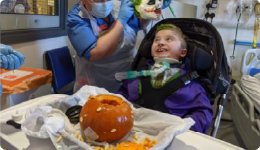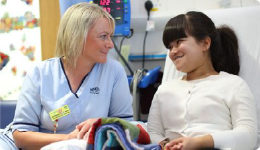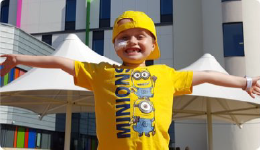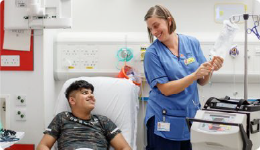We work with the Vaccine Group at the Glasgow Clinical Research Facility to help support trials of new vaccines to prevent infectious diseases in children. We are also interested in how well existing vaccines protect children. For example, Dr Louisa Pollock is working in partnership with the MRC University of Glasgow Centre for Virus Research (CVR) to undertake a study using routinely collected clinical information to work out whether vaccinating mothers against Covid-19 before or during pregnancy protects their babies from infection with the Covid-19 virus in the first year of life.
Infectious Diseases and Immunology Research


The infectious diseases and immunology team is active in different kinds of research trying to improve care for children with infectious diseases, children born with conditions which affect their immune system (Primary Immunodeficiencies) and those with other childhood immunological conditions.
Though much of the research is based in Glasgow, we can sometimes include children from all over Scotland through the Scottish Paediatric and Adolescent Infection and Immunology Network (SPAIIN).
Some of our work involves studying routinely collected clinical information. This work follows secure processes to respect the privacy of our patients. There is more information on how NHS Scotland uses clinical information here.
Our research focuses on the following themes:
Epidemiology is the study of how many people are affected by a disease, who is more likely to be affected, and why certain people are more at risk. When new infections emerge, or known infections behave differently than usual, we collect clinical and social information to better understand how children are affected and why. Understanding the changing epidemiology of infectious diseases can help us work out how to prevent infections, help doctors in diagnosis and treatment of children and help plan our health services.
For example, we helped collect and analyse national data for the ISARIC study which described the first hospitalised cases of Covid-19 in children in the UK. This helped identify which children were more vulnerable to Covid-19 due to other health conditions, and helped us target national vaccine programmes.
In 2022, we worked with Public Health Scotland and research scientists at the MRC University of Glasgow Centre for Virus Research to investigate an unusual outbreak of severe hepatitis in children in Scotland and across the world. We were able to determine that infection with two viruses at the same time (AAV2 and adenovirus), in children who shared a common genetic type (HLA type), was the most likely cause. We think the hepatitis was caused by the immune system response to the viruses, rather than the virus itself, which helps guide ways to treat this condition.
We are currently working with Public Health Scotland and others to investigate a recent rise in cases of severe infection with the bacteria Group A Streptococcus.
We support trials of new treatments for infectious diseases. For example, we tested new treatments for Hepatitis C and found they were safe and worked well. These drugs are now recommended worldwide and can cure this disease.
Although primary immunodeficiencies and other immunological conditions affect many children in Scotland, many of the individual conditions themselves are rare. We work with international collaborative research studies to share clinical and genetic data on rare immunological conditions, so we can give better information to families and help determine the best treatment.








